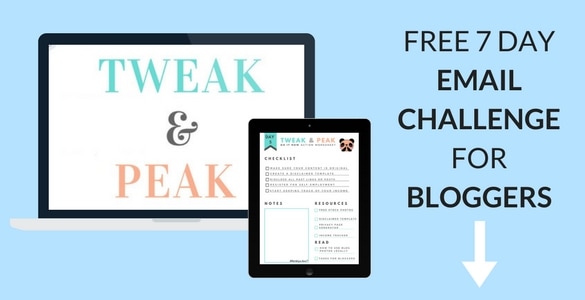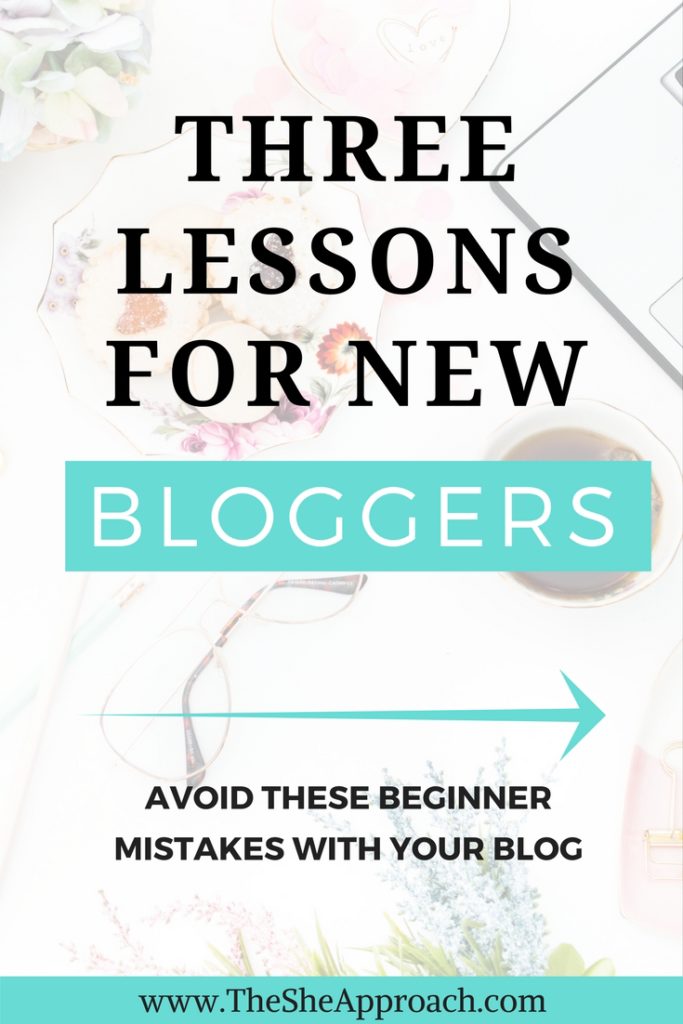It struck me the other day, while I was writing another blog post filled with blogging tips for beginners, that I am relatively still a beginner myself in the mysterious and ever developing blogging world.
And even though I am a fast learner and I love to share my own experience (either past or present) when it comes to running a blog, I thought today I would invite someone who has been doing this for longer than I have to talk about what you need to know as a beginner blogger.
Here is Tori from Bootstrap Millennial speaking about lessons bloggers should learn quickly:
I started blogging professionally in 2012 as a freelance ghostwriter on Elance. It was probably the worst possible decision I could make for entry into the professional writer’s field because nothing, and I really mean nothing, that I wrote had my name on it once published.
The only thing I had to show for my success was a 5 star rating on Elance itself, which was shut down in 2015. Seeing the death of my career upon me I scored a gig with Lifehacker, a dream job for career bloggers. But the thing about dream jobs is they’re still jobs, which means you’re still putting too many eggs in someone else’s basket and they can evict you and devalue you at any moment. So I quit.
In the following months I built two businesses. One of which has nothing to do with blogging, and the other of which has everything to do with blogging. I got to learn first hand how to be a successful independent blogger, and the following are the top three lessons I learned to get here.
The Objective Is Not Self-Expression
Don’t get me wrong, you get to express your opinions and ideas and stories plenty as a blogger, but only when and in the ways your expression helps your ideal reader.
Your readership determines when and how that expression is appropriate, otherwise, you’re running a diary, not a blog. You’re not making money from a diary. Trust me.
Blogging is like a business, which means your readers’ needs in guidance, motivation, and education takes priority over your need to express. If you have a rough day and decide “I’m going to blog about this” — that’s why you’re not getting any readers when you promote the post. (Yes I already know you’re not getting readers). This is because your readers aren’t here to be your shoulder to lean on or cheerleaders for your successes and challenges. They’ll do that if they love you, but ultimately they’re here to gain something from your content.
So you should be serving them, not yourself, in order to gain their loyalty. Your mindset has to be more aligned with: “What kind of day is my ideal readers having? What can I write about that will help them?” Then your readers will love you, share your work, and your blog will grow.
Your mindset has to be more aligned with: “What kind of day is my ideal readers having? What can I write about that will help them?” Then your readers will love you, share your work, and your blog will grow.

Ads Aren’t Where The Money Is
If you’re waiting to get enough traffic to gain advertiser interest — think again. Selling ad space generally covers the blog’s marketing and upkeep expenses, and might pay a bill or two. But it’s not the bread and butter of any blog that’s not on the Gawker Empire or Huffington Post level of exposure.
This empire has huge teams of people that make them as big as they are. You’re one person, so your objective needs to shift from what the media is showing you. Making money and being financially free while blogging is totally doable, you just have to do it a little differently if your blog isn’t an empire.
Use your blog to sell services or products. If you really just want to spend your life writing your heart out I recommend becoming an affiliate marketer of a select 3 or 4 products in your niche and selling them. Just provide your readers with valuable content and input the links in organically appropriate locations. When you really get the hang of it and become addicted to sales success (you will, if you stick with it), you’ll start creating sales funnels and pushing the products harder.
When you’re ready for that your first step is to create a value ladder. Have a couple of low priced products you sell to warm your readership up and get them to trust your endorsements, then move them up the value ladder systematically so that they’re spending a little more each time. The top product should be a high-ticket item that you make big commission from. This is where your financial freedom lies.
But it’s not the bread and butter of any blog that’s not on the Gawker Empire or Huffington Post level of exposure. These empires have huge teams of people that make them as big as they are. You’re one person, so your objective needs to shift from what the media is showing you. Making money and being financially free while blogging is totally doable, you just have to do it a little differently if your blog isn’t an empire.
Use your blog to sell services or products. If you really just want to spend your life writing your heart out I recommend becoming an affiliate marketer of a select 3 or 4 products in your niche and selling them. Just provide your readers with valuable content and input the links in organically appropriate locations. When you really get the hang of it and become addicted to sales success (you will, if you stick with it), you’ll start creating sales funnels and pushing the products harder.
When you’re ready for that your first step is to create a value ladder. Have a couple of low priced products you sell to warm your readership up and get them to trust your endorsements, then move them up the value ladder systematically so that they’re spending a little more each time.
The top product should be a high-ticket item that you make big commission from. This is where your financial freedom lies.
Word Count Isn’t Real
Write as much as you need to create a quality post. No more, no less. When collaborating with other blogs and writing guest posts don’t even ask about a word count. Don’t talk about it. It isn’t real.
No one actually cares about those numbers. They don’t mean anything, not to your readers, not to your connections’ readers, and not to your connections. There are trends, there are statistics, but none of them override the necessity to create a top quality post.
Therefore creating value is your only focus. If you set a “600 words” precedent you’re hindering your ability to avoid fluff and/or thoroughly explain your topic.
If someone else (likely a novice on content creation or an ill-informed “expert”) brings the word count topic in your direction for a post you’ve written, kindly tell them why all of the information you provided is necessary, and why it’s enough. Give them a heads up that changing the post will reduce quality, and move forward from there.
Becoming a successful blogger is a journey, and it won’t happen quickly, but it will happen. There are so many other lessons to learn, so my last bonus tips is to keep being eager to learn.
Choose your “gurus”, your mentors. Pay attention to those who are succeeding in the ways you desire to succeed, and follow that path with your own unique content and flair. You’ll get there if you keep at it.
















When do you think we can start apply for affiliate network? (ex. F21, ASOS, etc) Some brands put it out like they require at least 1000 blog followers. Should we wait until we have 1k or 10k followers in order to join affiliate network? What is your suggestion?
Hi Maggie,
That’s a great question. Some affiliate networks do not require you to have a set number of visitors because they care more about quality (when it comes to ad companies, that’s a different story).
So I would suggest to focus on the content in the first months of blogging, just until you can really manage your site, and then apply to what you can.
Then go back and insert the affiliate links in the posts that make sense.
But don’t wait until you have 10k followers. Or even 1k. You might be losing on tons of opportunities. Have a good website, great content and connect with your readers (don’t try to oversell them on things).
Do some research on the affiliate programs that make sense for your content and join them as soon as you have a base for your blog.
Hope this helps.
x
Wow!!! I just saw your enter your giveaway post on FB (which I did 🙂 ) but then decided to read a couple posts and so glad I did. This was truly helpful for me. I learned a lot
Lisa Elaine
Hi Lisa,
I am so glad to hear this! Thanks so much for checking my blog out.
Kind regards,
Ana
This is a really interesting post to read. I have read many posts that stated the word count needs to be around 1000 which i find to be a bit too much! I think that everyone should feel free to write the amount that is best for them 🙂
Sarah | What Sarah Writes | Last chance to enter my giveaway
Hi Sarah,
I agree. Sometimes it depends on the topic as well. I wouldn’t read 1000 words beauty posts but I would if the topic was blogging or things that need to be discussed more in depth.
Thanks so much for your comment! x
‘keep being eager to learn’. I think this is definitely most important as its the thing that will help you progress further. Thanks for sharing this post!
http://www.upyourvlog.com
Yes! I Think that’s so important! Thank you for stopping by!
You’re not making money from a diary hahaha! That’s so well said, I might steal that quote!! This is another brilliant post you’ve done, you’re a genius! I agree with all of it, 100%. Bloggers need to blog about what others want to be reading (because re-reading your own stuff won’t get you money no matter how much you like it – if you’re the only one reading it then you might as well just keep a diary and not publish it!). And the word count as well – although they do say it shouldn’t be shorter than 200 words and longer than 3,000 or around that threshold because otherwise Google doesn’t crawl it properly but you get the feel for what those sizes are really quickly and I’ve never actually counted my words as such! x
I am so bad at seeing these comments in time.
But I agree! I see so many people treating it as diaries and they eventually give up because life trumps hobbies.